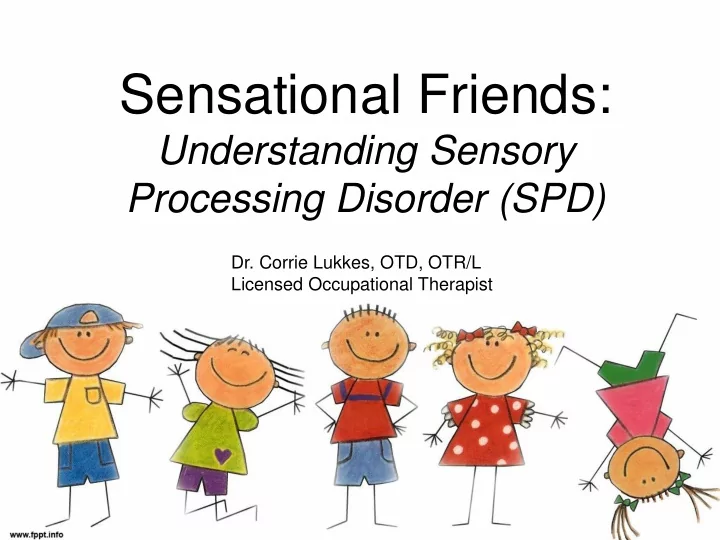

Sensational Friends: Understanding Sensory Processing Disorder (SPD) Dr. Corrie Lukkes, OTD, OTR/L Licensed Occupational Therapist
Objective The goal of this presentation is to educate parents and caregivers about occupational therapy and sensory processing disorder, as well as provide information about the 3 basic senses and assessments to diagnose SPD.
Outline • What is occupational therapy? • Introduction to Sensory Processing Disorder • The Senses • Processing Issues of the Main Senses • Now what? • References and Resources
OCCUPATIONAL THERAPY
What is Occupational Therapy? • American Occupational Therapy Association – Occupational therapists and occupational therapy assistants help people across the lifespan participate in the things they want and need to do through the therapeutic use of everyday activities (occupations). http://www.aota.org/about-occupational-therapy.aspx
Occupational Therapy • Geriatrics – Memory – Quality of Life • Adults – Stroke (CVA) – Traumatic Brain Injury (TBI) – Upper extremity injuries • Pediatrics – Developmental delay – Chromosomal and genetic defects – Hemiparesis and strengthening – Sensory processing difficulties
Pediatric OT • Developmental milestones • Weight bearing, strength • Sitting, balance • Fine motor • Coloring • Handwriting • Visual motor • Puzzles • Building with blocks • Self-help • Dressing, feeding, grooming, toileting, sleeping • Sensory processing • Hyper-/hypo- responsive • Seeking
SENSORY PROCESSING
What is Sensory Processing? • “Refers to the way the nervous system receives messages from the senses and turns them into appropriate motor and behavioral response” (from www.spdfoundation.net) • Unconscious process of the brain • Everything we do involves sensory processing
Sensory Processing Disorder (SPD) • Occurs when sensory signals do not reach the brain in an organized manner, which leads to inappropriate responses • The brain must receive, recognize, interpret, formulate, and execute appropriate responses to sensory input • RESPONSE IS KEY!
Where Does Processing Occur? • Sensory processing occurs in the brain – Kids with SPD have a “roadblock” – We can help retrain the brain to work in a more functional way – Neural plasticity – the brain is constantly developing in kids!
What Can I Expect From a Child? • Children with SPD might require – Extra sensory input – Sensory input delivered in many different ways – Desensitization – Avoid some types of input
SPD kids are awesome! • Children with SPD are not behaving badly on purpose – kids naturally want to please – seeking to regulate themselves because their bodies do not feel good
THE SENSES
About the senses • Basic Primary Senses – Vestibular – Proprioceptive – Tactile • Higher level senses – Vision – Auditory – Olfactory – Taste – Introspection
Vestibular System • Vestibular – Movement – Responds to position of the head in relation to gravity and accelerated or decelerated movement – Receptors in the inner ear
Issues with Vestibular Processing • Kids with difficulties with vestibular processing may: – Spin – Watch car wheels spin – Swing or dislike swinging – Have excess or not enough energy
Proprioceptive System • Proprioceptive – Gravity – Felt in muscles and joints – Body awareness – Spatial awareness
Issues with proprioceptive processing • Kids who seek proprioceptive input might: – Toe walk – Jump – Crash – Climb • Kids who need proprioceptive input like: – Hugs – Small spaces – Heavy blankets
Tactile System • Tactile (Touch) • Kids with difficulties with tactile processing may: – Avoid or seek touching textures (including clothes and foods) – Avoid or seek oral sensory input – Refuse to bathe or shower – Dislike shoes off – Refuse to go in grass or sand
When All Systems Are Go • End products of the integration of all senses • Ability to concentrate • Ability to organize • Self-esteem • Self-control • Self-confidence • Academic learning ability • Capacity for abstract thought and reasoning • Specialization of each side of the body and brain
Sensory Diets • Should be tailored to each child’s needs and likes/dislikes • Should be integrated into the your daily routine • Give parents tools to problem solve and let them decide what works best • Based off of parent report, Sensory Profile, 2 nd Ed., clinical observation
I HAVE SENSORY CONCERNS FOR MY CHILD, NOW WHAT?
How do I get therapy? • Birth – 3 years old – Call your local Child and Family Connections office (CFC #6 847-385-5070) – You can get a free evaluation and might qualify for home based services • 3 – 5 years old – Contact your local school district and ask to be evaluated – Caution – SPD alone won’t qualify a child for school services • All ages – Pediatric clinic evaluation
Remember….. • SPD can affect all areas of life! – Sleeping – Feeding – Attention and participation – Activity level – Development of fine motor school skills – Social interactions • You name it, SPD can affect it!
References and Resources • Sensory Processing Disorder Foundation www.spdfoundation.net • Star Center Sensory Therapies and Research: http://spdstar.org/ • Sensory Integration and The Child by Jean Ayers • The Out of Sync Child and The Out of Sync Child Has Fun by Carol Kranowitz • Raising a Sensory Smart Child by Lindsey Biel • Sensational Kids by Lucy Jane Miller • Sensory Processing Disorder by Dr. Lucy Jane Miller: http://youtu.be/QDaj4daRWJc • Facebook – networking is great!
Recommend
More recommend